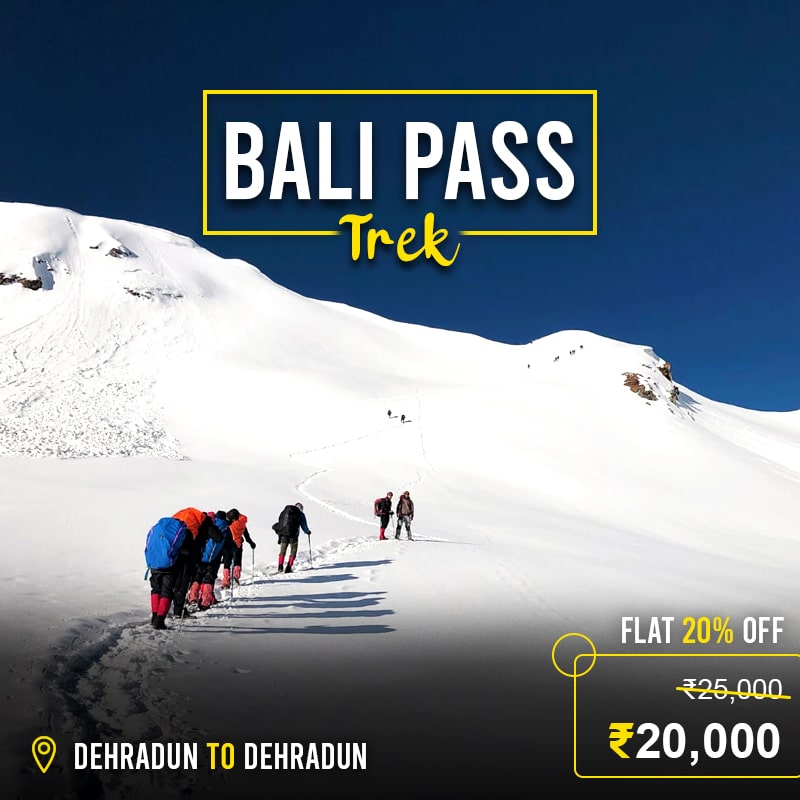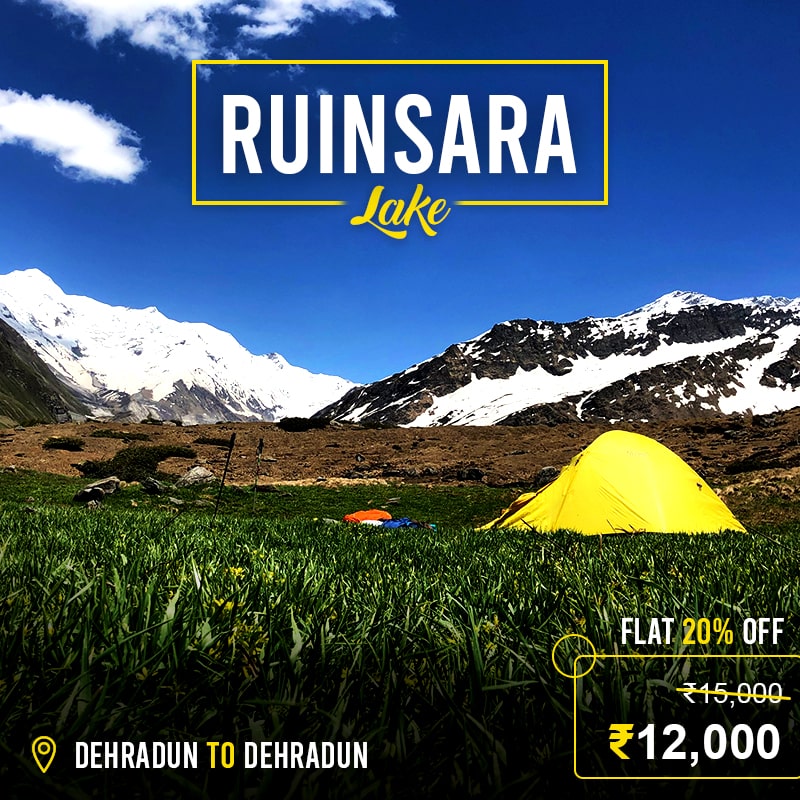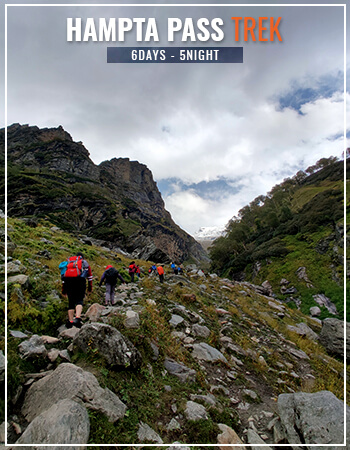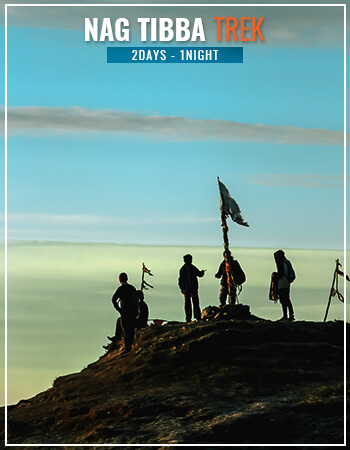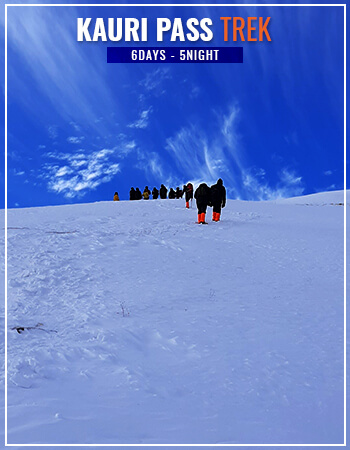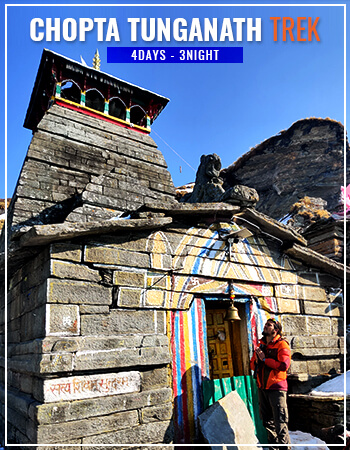LAMKHAGA PASS TREK
9 Days - 8 Night
9 Days - 8 Night
17,320 ft.
Moderate
Kinnaur
ABOUT
LAMKHAGA PASS TREK
The Lamkhaga Pass Trek connects Harsil, one of the most beautiful places in Uttarakhand, to Chitkul, the last village before the Indo-Tibet border, in Himachal Pradesh. It is definitely one of the toughest treks in the Himalayas and certainly one of the least frequented due to its near proximity to the border. The trek starts in Kyarkoti, which also serves as the base camp for the renowned Black Peak Expedition, and continues through scree, moraine, steep climbs, crevassed glaciers, boulders, and the 5280-meter-high Lamkhaga Pass until arriving in Chitkul.
SHORT ITINERARY
-
DAY 1
Drive from Dehradun to Harsil (230Km)
-
DAY 2
Trek from Harsil to Kyarkoti (3840 m) - 14 km
-
DAY 3
Kyarkoti to Lamkhaga Pass Base Camp (4420 m) - 12 km
-
DAY 4
Acclimatisation
-
DAY 5
Lamkhaga Base Camp to Gundar (4415 m) via Lamkhaga Pass (5281 m) - 13 km
-
DAY 6
Gundar to Dumti (4035 m) - 15 km
-
DAY 7
Dumti to Rani Kanda (3680 m) - 9 km
-
DAY 8
Rani Kanda to Chitkul (3435 m) - 9 km
-
DAY 9
Depart from Chitkul
DETAILed ITINERARY
Day 1: Drive from Dehradun to Harsil (230Km)
Arrive in Harsil, one of Uttarakhand’s most picturesque villages, located near Gangotri in the Uttarkashi area. Dehradun is about 230 kilometers away. If you want to travel with us, we will pick you up from Dehradun ISBT at 9 a.m. and drive you to Harsil. Spend the night in a hotel or guesthouse.
Day 2: Trek from Harsil to Kyarkoti (3840 m) – 14 km
Today we will begin our trek to Kyarkoti, which will take us through dense forests and breathtaking scenery. On the way to the campsite for the night, you get to see a stunning variety of flora and fauna as well as cascading waterfalls. Tents would be used for the night.
Day 3: Kyarkoti to Lamkhaga Pass Base Camp (4420 m) – 12 km
At a height of 4420 meters, we will trek to the Lamkhaga Pass base camp. Due to snow slopes and moraines, the climb is steep and difficult. Because of the treacherous terrain and narrow valley, technical equipment can be needed. Tents would be used for the night.
Day 4: Acclimatisation
We’ll rest and acclimate to the high altitude today, then prepare for the challenging and taxing pass crossing the next day. Tents would be used for the night.
Day5: Lamkhaga Base Camp to Gundar (4415 m) via Lamkhaga Pass (5281 m) – 13 km
We’ll leave the base early today in order to cross the Lamkhaga Pass. Due to the steep terrain and near-vertical climb, traversing this pass would necessitate the use of equipment and rope. The view from the pass is stunning, with glaciers and snowfields on both sides and lofty jagged Himalayan peaks on either side. We’ll use ropes to begin our descent to the Gundar campsite. Tents would be used for the night.
Day 6: Gundar to Dumti (4035 m) – 15 km
Today will be a long trek with sheer descents, so leave the campsite early. Dumti is where you’ll spend the night.
Day 7: Dumti to Rani Kanda (3680 m) – 9 km
The trail to Rani Kanda is breathtaking, with a valley full of vibrant flowers and breathtaking waterfalls. It’s quite a sight to see. Tents would be used for the night.
Day 8: Rani Kanda to Chitkul (3435 m) – 9 km
Chitkul, the last village in the Baspa Valley and the last village before the Indo-Tibet border, is our destination today. Spend the night in a hotel or guesthouse.
Day 9: Depart from Chitkul
If you choose our transportation, we will pick you up from your Chitkul hotel and drive you to Shimla. The journey is approximately 250 kilometers long. By late evening, we will drop you off at Shimla ISBT.
DETAILed ITINERARY
Day 1: Drive from Dehradun to Harsil (230Km)
Arrive in Harsil, one of Uttarakhand's most picturesque villages, located near Gangotri in the Uttarkashi area. Dehradun is about 230 kilometers away. If you want to travel with us, we will pick you up from Dehradun ISBT at 9 a.m. and drive you to Harsil. Spend the night in a hotel or guesthouse.
Day 2: Trek from Harsil to Kyarkoti (3840 m) - 14 km
Today we will begin our trek to Kyarkoti, which will take us through dense forests and breathtaking scenery. On the way to the campsite for the night, you get to see a stunning variety of flora and fauna as well as cascading waterfalls. Tents would be used for the night.
Day 3: Kyarkoti to Lamkhaga Pass Base Camp (4420 m) - 12 km
At a height of 4420 meters, we will trek to the Lamkhaga Pass base camp. Due to snow slopes and moraines, the climb is steep and difficult. Because of the treacherous terrain and narrow valley, technical equipment can be needed. Tents would be used for the night.
Day 4: Acclimatisation
We'll rest and acclimate to the high altitude today, then prepare for the challenging and taxing pass crossing the next day. Tents would be used for the night.
Day 5: Lamkhaga Base Camp to Gundar (4415 m) via Lamkhaga Pass (5281 m) - 13 km
We'll leave the base early today in order to cross the Lamkhaga Pass. Due to the steep terrain and near-vertical climb, traversing this pass would necessitate the use of equipment and rope. The view from the pass is stunning, with glaciers and snowfields on both sides and lofty jagged Himalayan peaks on either side. We'll use ropes to begin our descent to the Gundar campsite. Tents would be used for the night.
Day 6: Gundar to Dumti (4035 m) - 15 km
Today will be a long trek with sheer descents, so leave the campsite early. Dumti is where you'll spend the night.
Day 7: Dumti to Rani Kanda (3680 m) - 9 km
The trail to Rani Kanda is breathtaking, with a valley full of vibrant flowers and breathtaking waterfalls. It's quite a sight to see. Tents would be used for the night.
Day 8: Rani Kanda to Chitkul (3435 m) - 9 km
Chitkul, the last village in the Baspa Valley and the last village before the Indo-Tibet border, is our destination today. Spend the night in a hotel or guesthouse.
Day 9: Depart from Chitkul
If you choose our transportation, we will pick you up from your Chitkul hotel and drive you to Shimla. The journey is approximately 250 kilometers long. By late evening, we will drop you off at Shimla ISBT.
subscribe Now
Get Quote
DEPATURE DATE
Everyday Batch. Call- +91-9458118063 | +91-7579480944
Everyday Batch. Call- +91-9458118063 | +91-7579480944
Everyday Batch. Call- +91-9458118063 | +91-7579480944
Everyday Batch. Call- +91-9458118063 | +91-7579480944
COST INCLUSION
-
Pick and Drop Service from mentioned location
-
Fees for the guide and the chef
-
Camping facilities' rent
-
Entrance fees to the forest
-
To transport camping gear, a porter and mule are required. Please keep in mind that personal baggage can be borne by mules and/or porters for a fee
-
From the first day's dinner until the last day's brunch, both of the meals are vegetarian
-
Throughout the walk, you'll be staying in a tent or if possible, then in a guest house
COST EXCLUSION
-
No pickup and drop point from/for your hometown
-
Personal costs include things like tips, personal medications, and conference calls, etc
-
Apart from what is mentioned above, some transportation assistance during the trek
-
Porters/mules can carry personal luggage weighing up to 12 kg per bag per person for Rs 500 per day per bag
subscribe Now
Frequently asked question
- Footwear: The trekking boots which must be waterproof and snow proof, normal boots, floaters, and woolen socks.
- Backpack: (50 ltr), Daypack (20-30 ltr), Duffel bag.
- Clothes: Jacket and trousers that are both waterproof and breathable. Jacket (synthetic or down feather fleece), synthetic insulated trousers, poncho, sweatshirt, inner thermal (upper & lower), fleece, t-shirts, cotton trekking pants, shorts
- Season wise Clothes:
- Hand and head protection includes liner gloves, bandannas, sun hats, woollen caps, and face masks, among other things.
- Accessories: Sunglasses/goggles, anti-glare lenses, water bottle, hydra bag, and headlamp with spare bulb and extra batteries are all recommended.
- Trekking Gears: Toolkit for an emergency. Sunscreen, a toiletry pack, water purification pills, Ziploc packs, ear plugs, first-aid kit, and the necessary medications are all recommended.
- Camping Equipment: Sleeping bags of lining (extreme -5 to +5 Celsius if you have one), trekking sticks, and so on.
- Warm top/light micro fleece pullover/full sleeve T shirt – 2/3
- Water resistant/repellent trekking pants with an inner lining for added warmth- 2 High-quality windproof/water-resistant outer shell (jacket) with a proper hood
- Thick Fleece / Full-sleeve Woollen Jumper, Down Jacket with at least 600 fill capacity Innerwear with a thermal component (upper and lower)
- Woolen hat, inner fleece gloves, and outer water-resistant gloves
- 4–5 pairs of thick woollen socks and standard socks, scarf/muffler (optional)
- Waterproof Trekking/Hiking shoes with a thick heel and high ankles that are comfortable to wear. Sneakers/sport shoes are ideal for camp.
- Poncho or raincoat. A small, light-weight towel
- A hydration pack and an insulated water bottle (optional)
- Sunglasses with UV cover and the potential to cut light, as well as a cap or floppy hat to shield the strong sun off your skin (important when traversing through snow)
- Trekking pole or sturdy walking stick Lip Balm, Sunscreen Lotion
- Flashlight / torch (with extra batteries) Medications, if any special prescription is needed Toiletries for personal use
- Carry a rain cover over your luggage • Day pack/small bag that you can carry on your back all day to keep your essentials in
- Keep a few poly bags or plastic containers in your bag to place your things in if you need to in case of heavy weather.
Personal Medical Kit (MANDATORY FOR ALL)
- 10 Diamox tablets (to prevent AMS)
- Nifedipine – 5 pills Dexamethasone – one strip
- 6 tablets of Crocin (fever)
- 4 tablets of avomine (motion sickness) 4 capsules of Avil 25mg (allergies)
- 4 tablets of Combiflam (Pain killer)
- 6 tablets each of Norflox TZ and Lomofen (diarrhea) 10 tablets of Digene (acidity)
- 10 Omez/Rantadine capsules (antacids) 3 to 5 metres of crepe bandage
- 1 tiny roll of gauze 10 strips of bandage 1 small roll of cotton 10 packets of ORS
- Moov spray Betadine or other antiseptic cream (aches, & sprains)
- If you're vulnerable to knee injuries, you should wear a knee cap. Powder with antifungal properties
- Cancellation: If a trek is cancelled at the last minute due to a natural disaster or unforeseeable circumstances (such as floods, earthquakes, landslides, attack, or bandh), Discoveryhike will have a trek voucher for the full number. The voucher can be used for the same or a different trek over the next year.
- In case you wish to cancel the trek, then please be aware of these things:
- Cancellations made within 30 days of the trek's launch date will include a complete refund.
- If you cancel within 30 and 20 days before the hike, you will get a 50% refund.
- There will be no refund if you cancel less than 20 days before the trek begins.
- Please keep in mind that if you get a refund, there will be a reduction of 4% (Cancellation charges) from the overall amount you pay. In addition, if you purchased trek insurance, you would not get a refund.
- Discoveryhike assumes no responsibility for any malfunction or injury to your clothes, supplies, or other belongings while on the trek. The trek fee covers all expenses associated with the trek from start to finish.

